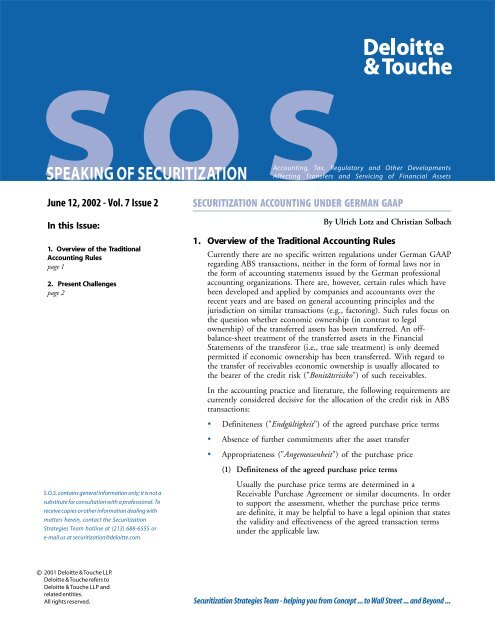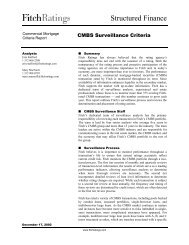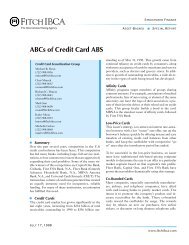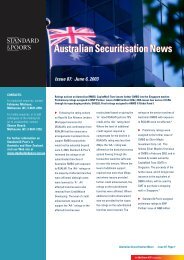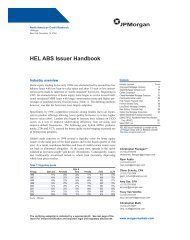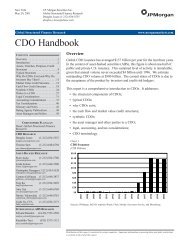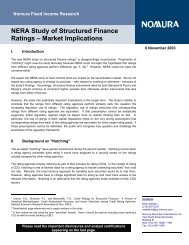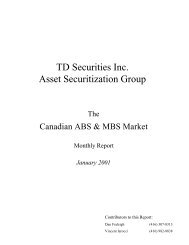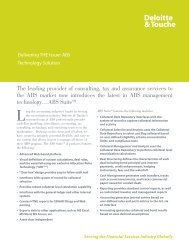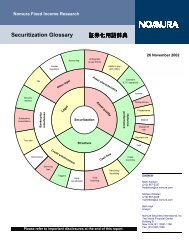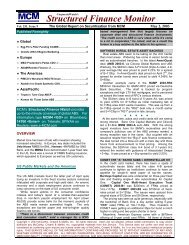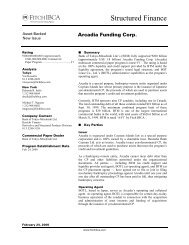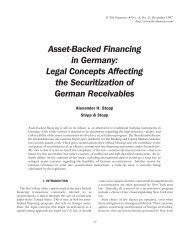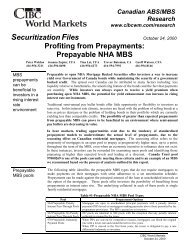Securitization Accounting Under German GAAP - Securitization.Net
Securitization Accounting Under German GAAP - Securitization.Net
Securitization Accounting Under German GAAP - Securitization.Net
You also want an ePaper? Increase the reach of your titles
YUMPU automatically turns print PDFs into web optimized ePapers that Google loves.
S O<br />
S<strong>Accounting</strong>, Tax, Regulatory and Other Developments<br />
Affecting Transfers and Servicing of Financial Assets<br />
SPEAKING OF SECURITIZATION<br />
June 12, 2002 - Vol. 7 Issue 2<br />
In this Issue:<br />
1. Overview of the Traditional<br />
<strong>Accounting</strong> Rules<br />
page 1<br />
2. Present Challenges<br />
page 2<br />
S.O.S. contains general information only; it is not a<br />
substitute for consultation with a professional. To<br />
receive copies or other information dealing with<br />
matters herein, contact the <strong>Securitization</strong><br />
Strategies Team hotline at (213) 688-6555 or<br />
e-mail us at securitization@deloitte.com.<br />
SECURITIZATION ACCOUNTING UNDER GERMAN <strong>GAAP</strong><br />
By Ulrich Lotz and Christian Solbach<br />
1. Overview of the Traditional <strong>Accounting</strong> Rules<br />
Currently there are no specific written regulations under <strong>German</strong> <strong>GAAP</strong><br />
regarding ABS transactions, neither in the form of formal laws nor in<br />
the form of accounting statements issued by the <strong>German</strong> professional<br />
accounting organizations. There are, however, certain rules which have<br />
been developed and applied by companies and accountants over the<br />
recent years and are based on general accounting principles and the<br />
jurisdiction on similar transactions (e.g., factoring). Such rules focus on<br />
the question whether economic ownership (in contrast to legal<br />
ownership) of the transferred assets has been transferred. An offbalance-sheet<br />
treatment of the transferred assets in the Financial<br />
Statements of the transferor (i.e., true sale treatment) is only deemed<br />
permitted if economic ownership has been transferred. With regard to<br />
the transfer of receivables economic ownership is usually allocated to<br />
the bearer of the credit risk ("Bonitätsrisiko") of such receivables.<br />
In the accounting practice and literature, the following requirements are<br />
currently considered decisive for the allocation of the credit risk in ABS<br />
transactions:<br />
• Definiteness ("Endgültigkeit") of the agreed purchase price terms<br />
• Absence of further commitments after the asset transfer<br />
• Appropriateness ("Angemessenheit") of the purchase price<br />
(1) Definiteness of the agreed purchase price terms<br />
Usually the purchase price terms are determined in a<br />
Receivable Purchase Agreement or similar documents. In order<br />
to support the assessment, whether the purchase price terms<br />
are definite, it may be helpful to have a legal opinion that states<br />
the validity and effectiveness of the agreed transaction terms<br />
under the applicable law.<br />
© 2001 Deloitte & Touche LLP.<br />
Deloitte & Touche refers to<br />
Deloitte & Touche LLP and<br />
related entities.<br />
All rights reserved.<br />
<strong>Securitization</strong> Strategies Team - helping you from Concept ... to Wall Street ... and Beyond ...
(2) Absence of further commitments after the asset<br />
transfer<br />
The transferor may have further commitments<br />
that preclude a true sale treatment, for example<br />
an agreement that both entitles and obligates the<br />
transferor to repurchase the transferred assets<br />
before their maturity or the option to buy back<br />
certain assets (other than through a clean-up call).<br />
(3) Appropriateness of the purchase price<br />
The major discussion point in practice and<br />
literature has been the definition of an<br />
appropriate purchase price or an appropriate<br />
discount, respectively. Although there are no fixed<br />
values of a maximum permitted discount that<br />
would achieve off-balance-sheet treatment, certain<br />
guidelines have been established which have<br />
mainly been based on factoring transactions.<br />
Thus, the purchase price discount in an ABS<br />
transaction should be compared with those<br />
discounts that are common in the factoring<br />
business. The discount in factoring transactions is<br />
usually determined on the basis of the quality of<br />
the receivables portfolio and therefore on the<br />
basis of the historical default rates of the portfolio<br />
as well as its structure (e.g., by industry, region or<br />
country). Since the range of judgement is quite<br />
large under these rules, a sound opinion on the<br />
accounting treatment can only be achieved if<br />
there is either a very small or a very significant<br />
discrepancy between the purchase price discount<br />
and the actual defaults. If, for example, even the<br />
worst-case credit risk expectations have to be<br />
borne by the originator, it can be concluded that<br />
the purchase price is not appropriate. The<br />
accounting guidance for all other cases, however,<br />
has been rather weak.<br />
2. Present Challenges<br />
In order to strengthen the <strong>German</strong> accounting guidance<br />
the <strong>German</strong> Institute of Chartered Accountants (Institut<br />
der Wirtschaftsprüfer - IDW) published a draft concerning<br />
the accounting treatment of ABS transactions (IDW ERS<br />
HFA 8) on October 30, 2001 which will have a strong<br />
impact on the <strong>German</strong> ABS market. As long as the<br />
statement has not been enacted, its observance is not<br />
mandatory, but recommended. The statement intends to<br />
clarify the existing <strong>German</strong> <strong>GAAP</strong>. Thus, it should already<br />
be taken into consideration when judging ABS<br />
transactions.<br />
The draft statement focuses on covenants that preclude the<br />
transfer of the credit risk of receivables and therefore of<br />
economic ownership. In particular, the draft statement<br />
discusses the purchase price discount issue. The draft<br />
statement distinguishes between fixed and variable<br />
discounts. Variable purchase price discounts are defined<br />
as discounts that are adjusted according to the collection<br />
of the receivables. While fixed discounts are not<br />
considered detrimental to the off-balance-sheet treatment<br />
of transferred receivables (regardless of their size), variable<br />
discounts have to be appropriate in order to achieve offbalance-sheet<br />
treatment for the transferor. The draft<br />
statement describes the requirement of appropriateness. A<br />
variable discount is considered appropriate, if it is based<br />
on historical default rates. A certain degree of adjustments<br />
for the uncertainty of statistical estimates is permitted. In<br />
the case of significantly higher variable discounts the<br />
credit risk remains with the transferor, and therefore the<br />
transferor will not be able to achieve an off-balance sheet<br />
treatment of the transaction.<br />
According to the draft statement all covenants that deal<br />
with credit risk have to be taken into account when<br />
judging which of the parties involved bears the credit risk<br />
of the transferred receivables, regardless of the form of the<br />
agreement or the name of the covenant (e.g., purchase<br />
price discount, reserve account, warranty account,<br />
servicing fee, excess spread). Only genuine dilution<br />
discounts or dilution reserves which result from rebates or<br />
bonuses towards the customers are not to be taken into<br />
consideration.<br />
In addition, the draft restricts the capitalization of reserve<br />
accounts in the Financial Statements of the transferor.<br />
Unlike the present accounting practice reserve funds are<br />
considered expenses until their settlement pursuant to the<br />
draft statement.<br />
In our opinion the statement, once mandatory, will lead to<br />
a more restrictive accounting treatment of ABS<br />
transactions in <strong>German</strong>y. Therefore, it becomes essential<br />
to discuss the transaction structure with accounting and<br />
legal advisory securitization professionals at an early stage<br />
of the transaction.<br />
The appeal period concerning the draft statement ended<br />
30 March 2002. It can be expected that no major changes<br />
will occur. The exact enactment date has not yet been<br />
published.<br />
The draft statement does not deal with the consolidation<br />
or non-consolidation of SPVs under <strong>German</strong> <strong>GAAP</strong>.<br />
However, further guidance on this issue is to be expected.<br />
- 2 -
Ulrich Lotz<br />
Ulrich Lotz is a Director at Deloitte & Touche GmbH<br />
Wirtschaftsprüfungsgesellschaft, Düsseldorf / <strong>German</strong>y and<br />
leads the company's <strong>Securitization</strong> Services. His<br />
responsibilities encompass trustee services, file due diligences<br />
and other assurance services, project management for clients<br />
as well as accounting, tax and regulatory consulting services.<br />
His experience comprises all areas of the banking business,<br />
including derivatives, real estate financing, corporate loans,<br />
and structured finance.<br />
Christian Solbach<br />
Christian Solbach is a Senior Consultant with the <strong>German</strong><br />
<strong>Securitization</strong> Group of Deloitte & Touche and focuses on<br />
delivering securitization consulting services in the <strong>German</strong><br />
market. He is a co-author of the 'Conventional versus<br />
Synthetic Securitisation - Trends in the <strong>German</strong> ABS Market'<br />
booklet issued by Deloitte & Touche.<br />
Ulrich is a licensed US Certified Public Accountant,<br />
Wirtschaftsprüfer (<strong>German</strong> Certified Public Accountant), and<br />
Steuerberater (<strong>German</strong> Certified Tax Consultant). He is a<br />
member of the American Institute of Certified Public<br />
Accountants (AICPA) and the <strong>German</strong> Institut der<br />
Wirtschaftsprüfer (IDW).<br />
- 3 -


